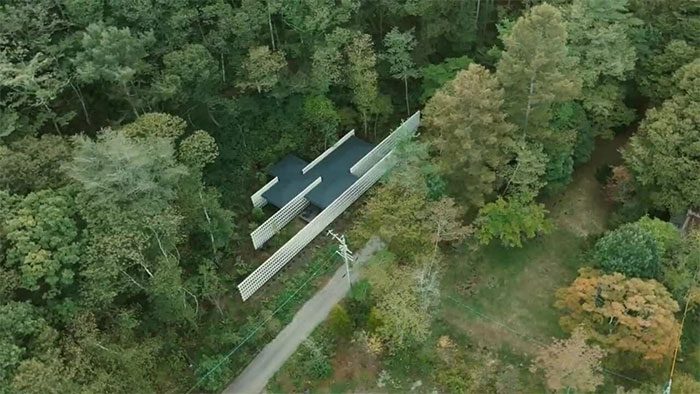The house in the mountainous region features a unique design with 3-meter-high walls made from approximately 2,050 blocks of carbon-absorbing concrete.
The house with 5 walls made from CO2-absorbing concrete. (Video: Design Boom)
A house in Karuizawa, a mountain town near Nagano, Japan, features the world’s first walls made from CO2-absorbing concrete named (CO2-SUICOM), as reported by Interesting Engineering on April 8. The house is located along a road on a 110-meter-long plot of land. Karuizawa is one of the oldest and most famous mountain resort towns in Japan.
This new type of concrete is produced by replacing a portion of the cement with an industrial byproduct while adding CO2-absorbing materials, thereby reducing emissions during production. It was developed collaboratively by Kajima Corporation, Chugoku Electric Power, Denka, and Landes.

CO2 absorbed is fixed within the concrete and will not escape into the atmosphere.
The strength of CO2-absorbing concrete is equivalent to that of conventional concrete. For its production, the molded concrete is placed in a curing chamber, where CO2 is pumped in for absorption. CO2 from various sources can be used directly. While conventional concrete emits about 300 kg of CO2 per cubic meter, CO2-SUICOM can achieve carbon neutrality (the amount of carbon emitted equals the amount absorbed). The absorbed CO2 is fixed within the concrete and will not escape into the atmosphere.
Nendo designed the concrete walls to resemble a protective grid. Approximately 2,050 concrete blocks were arranged in multiple rows to form 5 walls, each 3 meters high. The construction team adjusted the angles of the blocks to control visibility. Depending on the arrangement of the blocks, they managed what could be seen and what needed to be concealed, ensuring both ventilation and privacy.
Nendo utilizes carbon-absorbing concrete in construction to help reduce global CO2 emissions. According to a study published on ResearchGate in 2023, the production of cement and concrete worldwide accounts for about 8% of total carbon emissions. The CO2 emissions from energy used in the cement industry in 2020 amounted to approximately 1.2% of Japan’s total emissions.


















































